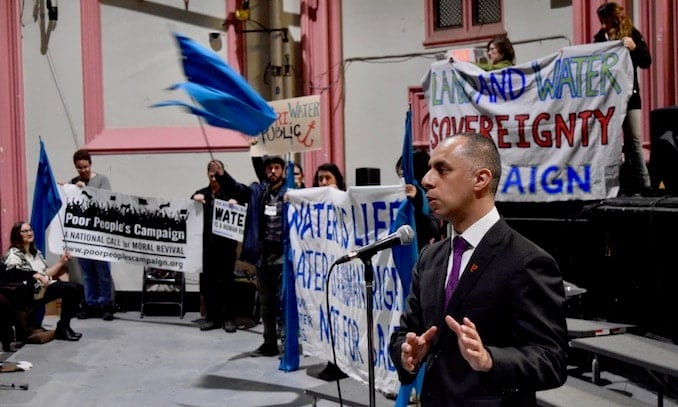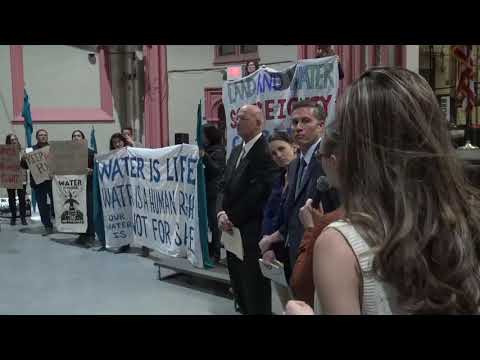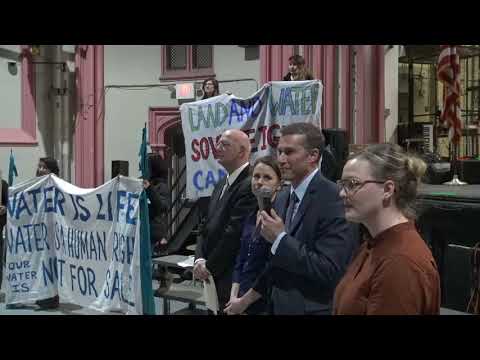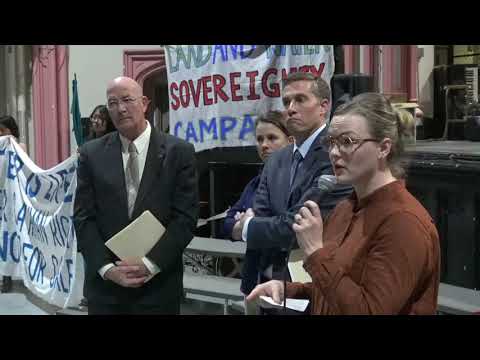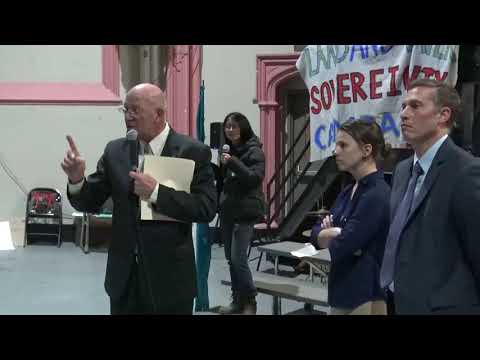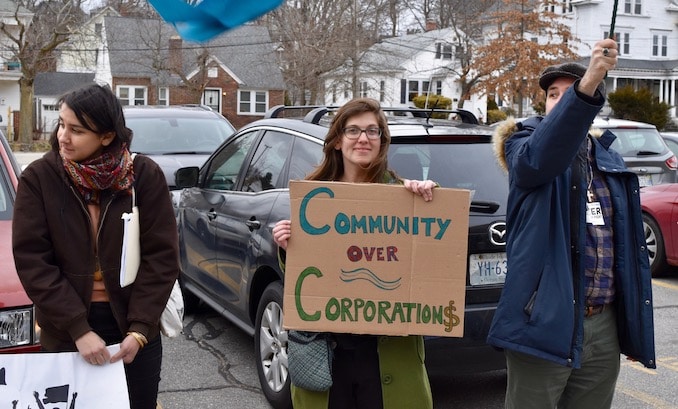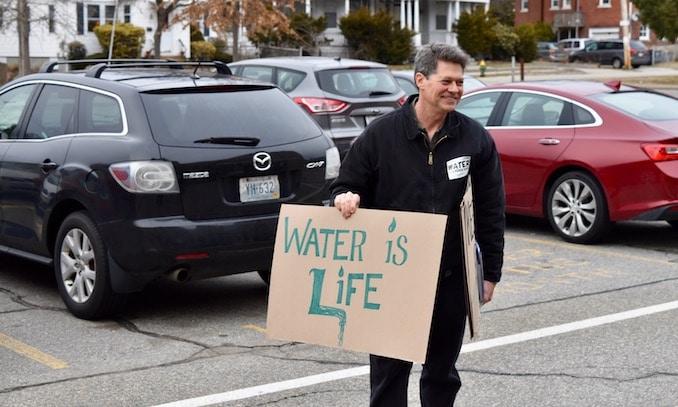Mayor Elorza’s second Community Conversation about monetizing Providence Water
Providence Mayor Jorge Elorza held the second of three scheduled Community Conversations on his idea to “monetize” Providence Water, that is, to enter into a public-private partnership with a large company that will pay the City for the rights to manage and profit from the Providence Water system. (See coverage of the first Community Conversation here.) The next Community Conversation
March 22, 2019, 2:53 pm
By Steve Ahlquist
Providence Mayor Jorge Elorza held the second of three scheduled Community Conversations on his idea to “monetize” Providence Water, that is, to enter into a public-private partnership with a large company that will pay the City for the rights to manage and profit from the Providence Water system. (See coverage of the first Community Conversation here.)
The next Community Conversation is scheduled for:
Monday, March 25 6pm-7:30pm, Nathan Bishop Middle School, 101 Session Street, Providence
Around fifty members of the public attended the meeting, most were from Providence but at least five people attended from the towns of Scituate and North Scituate. Present also were activists from Water Is Life – Land & Water Sovereignty Campaign, a group established to protect water in Rhode Island from corporate despoliation. The only elected official I noticed at this hearing besides Mayor Elorza was Providence City Councilor Katherine Kerwin (Ward 12). Kerwin was one of the Providence City Councilors to propose and support a resolution opposing “any and all forms of monetization and/or privatization of Providence water supply and sewer and of Scituate Reservoir.” (See: here and here.)
Elorza has linked the issue of a pending pension crisis to monetizing the water. As they had during the first meeting, members of Elorza’s administration spent some time explaining the scope and depth of the City’s unfunded pension. If nothing is done to address the pension system, which has gone underfunded for decades, Providence will be forced to raise taxes, make draconian cuts to City services, and may face bankruptcy, said administration officials.
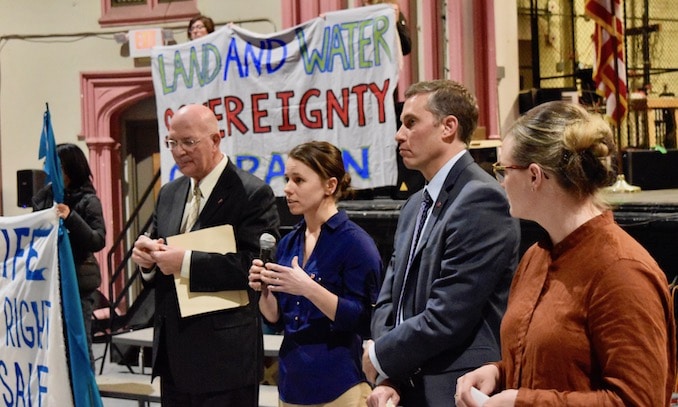
Mayor Elorza was both applauded and booed when he stepped up to speak to those attending the presentation. “I know that this is an issue that there are people with very, very deeply held beliefs and views. We welcome you to the conversation.” said Elorza, acknowledging the strong resistance to his plan to lease Providence Water to a private contractor from both activists and the general public.
Speaking about the legislation the administration has currently placed before the General Assembly, legislation that would enable Providence to lease the water system, Elorza was adamant. “It’s an uphill battle to get this legislation passed… If the version of the bill that we’re proposing doesn’t get passed this year… [we will] introduce it next year and the next year and the next year…”
Perhaps considering his legacy, Elorza said he wants he wants those judging his tenure in the future to be unable to say that, “Mayor Elorza said everything was fine, and now we have this looming crisis that has snuck up on is.”
The presentation, modified since the last time I saw it, was made by Elorza’s Chief of Staff Nicole Pollock. Last time, the administration was chided by the public for not providing enough information on the amount of money the City hoped to get from the deal. This time a possible number was provided, but only as an example.
In a slide, Pollock explained how a $400 million dollar cash infusion might impact City finances. Pollock was careful to stress that this was only an example, but many attending questioned whether or not any water deal could net that amount of money.
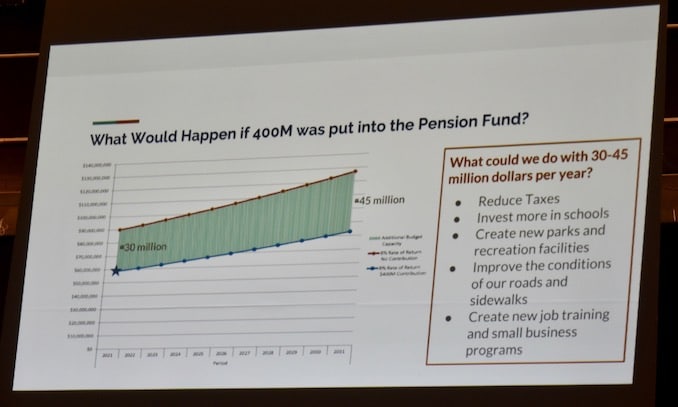
One of the first questions was about the legislation currently before the General Assembly. Right now, rate increases are granted to Providence Water by the Rhode Island Public Utilities Commission (PUC). The proposed legislation has rate increases built into the first five years, after which the PUC will once again be able to adjudicate rate increases for the lease holder.
“You’re coming before us hoping that no one has any information or any ability to do research,” said Gillian Kiley, who wrote about the possible sale or lease of the water system back in May 2018. “25 percent of any transaction like this, which I consider to be a., immoral and b., completely impractical, is eaten up [by transaction fees.] So take 25 percent away. That’s $300 million. $300 million does not solve the pension crisis once and for all or at all…”
Kiley went on to point out that there is no example of a water deal like the one proposed working out for the municipality. The three examples the City provided at the last Community Conversation by Providence City Solicitor Jeffrey Dana – Allentown, Pennsylvania; Rialto, California and Bayonne New Jersey – are all experiencing rate hikes, labor issues and/or water quality issues.
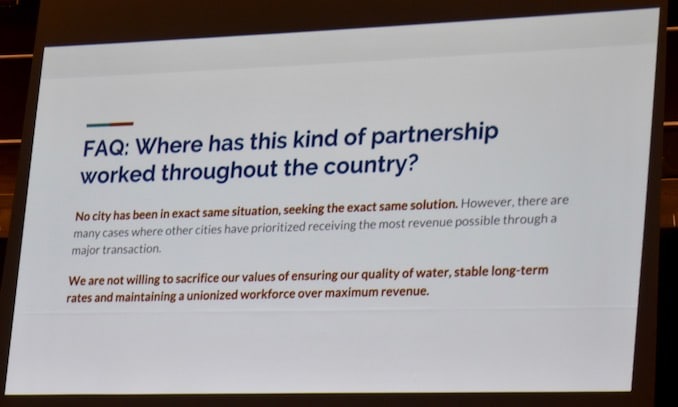
The administration backed off the examples they had previously presented, and instead insisted that Providence is in a unique situation, in that they are not entering into any deals while in crisis, but are doing so to prevent a crisis. They inserted a new slide, (above) to address these concerns.
Many in attendance took issue with the idea that “we’re all in this together,” as expressed by Dana. There were some who laughed out loud when he said this. They sensed that when the water is leased, the brunt of any negative effects will fall on low-income workers and people of color.
“There is no mention at all of Scituate in this plan, in this bill, anything, nothing. It’s like we don’t even exist and that is just wrong,” said woman from Scituate, who serves on the Scituate Land Trust Board. Providence Water owns the reservoir, which is located in Scituate.
In the video below, the protesters, who have been interrupting and commenting throughout, are challenged by a woman who is annoyed by their comments and interruptions. The woman got up and left in disgust, saying that she was leaning against the plan, but that the protesters “are turning me off.”
“I’m skeptical of this plan because I study Latin American politics and this has been tried hundreds and thousands of times around the world and it always ends badly… These are universally the most unpopular programs that have been put through as parts of neo-liberal reforms around the world – look around all over the United States it’s working badly – but somehow we’re supposed to believe it’s going to work really well in Providence…”
The next video shows the first person to speak even somewhat favorably about the plan to lease the water so far. He asked administration officials to explain what could happen if the City were to go into bankruptcy. As City Solicitor Jeffrey Dana explained the worst scenario, Providence resident Aaron Jaehnig accused him of fearmongering.
“It’s very possible it could be a forced sale without the protections in for rates, for environmental protections and for labor protections,” said Solicitor Dana. Jaehnig countered that the City isn’t doing enough to re-amoritize it’s payments.
“If nothing happens, when will the City go bankrupt?” asked a person in the audience. “And Providence isn’t the only City having problems. All over the United States Cities of a similar size are having similar size problems.”
Two problems with the plan are suggested from a person in the audience.
- In the event of a recession, any gains we make in stabilizing pension payments from leasing the water may be lost, as the pension fund may underperform or even lose money in the event of a recession.
- Since the profits that will be earned by any prospective company that leases the water will be coming from ratepayers, isn’t this instead a secret tax increase on ratepayers who will be paying extra for the water?
Scituate resident Alicia Kelley‘s family lost their land to build the resevoir over a century ago. “No one’s ever come to Scituate from Providence to have a conversation with our community about this,” said Kelley. The legislation introduced to the General Assembly “has come up three times, and we’ve never had a seat at the table.”
Greg Gerritt had a number of questions about how the lease of the water could possibly be profitable, given that numbers. This was a very interesting discussion between Gerritt and City Finance Director Larry Mancini.
Solicitor Dana talked about the issue of ownership of Providence Water. Many people, notably Speaker of the House Nicholas Mattiello, have claimed that the ratepayers from all the municipalities Providence Water serves have an ownership claim over Providence Water. Dana noted that court rulings in other cases usually don’t favor ratepayers, so he is confident that the City has a stronger ownership claim.
Another question about the profitability of Providence Water and the claim that the leasing company will make money through “economies of scale,” that is, by using their large size and purchasing power to reduce costs.
“I’ve tried to be respectful. I’ve sat hear and listened to both sides,” said a person from North Scituate, “I’m to understand… that a city that somehow, for the last two decades has headed for bankruptcy, is somehow capable of becoming not the 601st city, but the only city in the country that can pull off this magic trick, extracting massive amounts of money from the Suez Water country or God knows what they’re called?
“I apologize for losing it but I’ve listened to you guys for an hour and a half and I’m not buying it… This is the most absurd idea anybody’s ever come up with.”
Applause.
Uprise RI is entirely supported by donations and advertising. Every little bit helps:
Become a Patron!



